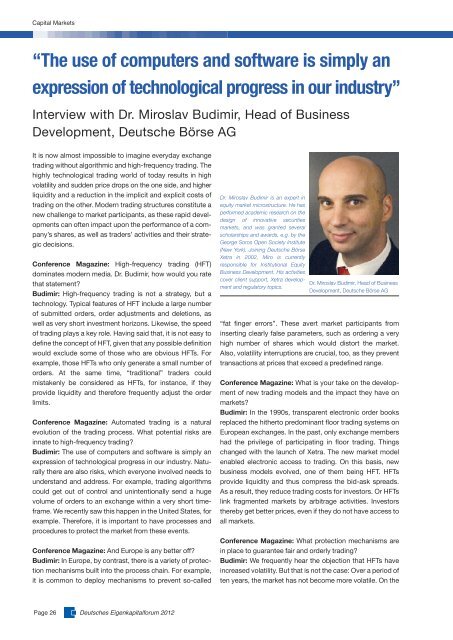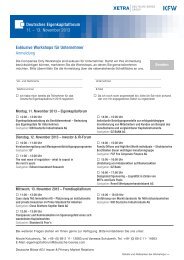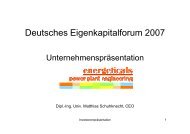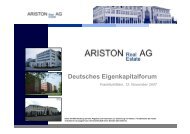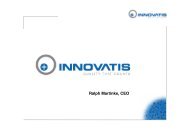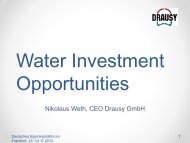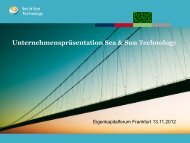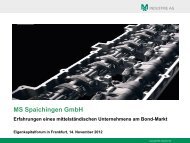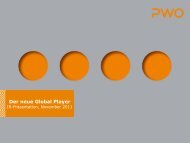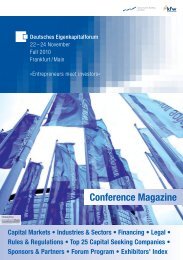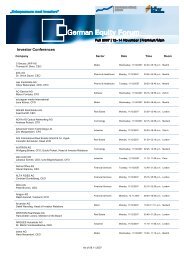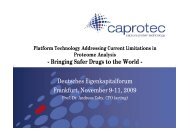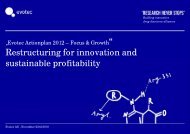Conference Magazine - GoingPublic.de - Deutsches Eigenkapitalforum
Conference Magazine - GoingPublic.de - Deutsches Eigenkapitalforum
Conference Magazine - GoingPublic.de - Deutsches Eigenkapitalforum
You also want an ePaper? Increase the reach of your titles
YUMPU automatically turns print PDFs into web optimized ePapers that Google loves.
Capital Markets<br />
“The use of computers and software is simply an<br />
expression of technological progress in our industry”<br />
Interview with Dr. Miroslav Budimir, Head of Business<br />
Development, Deutsche Börse AG<br />
It is now almost impossible to imagine everyday exchange<br />
trading without algorithmic and high-frequency trading. The<br />
highly technological trading world of today results in high<br />
volatility and sud<strong>de</strong>n price drops on the one si<strong>de</strong>, and higher<br />
liquidity and a reduction in the implicit and explicit costs of<br />
trading on the other. Mo<strong>de</strong>rn trading structures constitute a<br />
new challenge to market participants, as these rapid <strong>de</strong>velopments<br />
can often impact upon the performance of a company’s<br />
shares, as well as tra<strong>de</strong>rs’ activities and their strategic<br />
<strong>de</strong>cisions.<br />
<strong>Conference</strong> <strong>Magazine</strong>: High-frequency trading (HFT)<br />
dominates mo<strong>de</strong>rn media. Dr. Budimir, how would you rate<br />
that statement?<br />
Budimir: High-frequency trading is not a strategy, but a<br />
technology. Typical features of HFT inclu<strong>de</strong> a large number<br />
of submitted or<strong>de</strong>rs, or<strong>de</strong>r adjustments and <strong>de</strong>letions, as<br />
well as very short investment horizons. Likewise, the speed<br />
of trading plays a key role. Having said that, it is not easy to<br />
<strong>de</strong>fine the concept of HFT, given that any possible <strong>de</strong>finition<br />
would exclu<strong>de</strong> some of those who are obvious HFTs. For<br />
example, those HFTs who only generate a small number of<br />
or<strong>de</strong>rs. At the same time, “traditional” tra<strong>de</strong>rs could<br />
mistakenly be consi<strong>de</strong>red as HFTs, for instance, if they<br />
provi<strong>de</strong> liquidity and therefore frequently adjust the or<strong>de</strong>r<br />
limits.<br />
<strong>Conference</strong> <strong>Magazine</strong>: Automated trading is a natural<br />
evolution of the trading process. What potential risks are<br />
innate to high-frequency trading?<br />
Budimir: The use of computers and software is simply an<br />
expression of technological progress in our industry. Naturally<br />
there are also risks, which everyone involved needs to<br />
un<strong>de</strong>rstand and address. For example, trading algorithms<br />
could get out of control and unintentionally send a huge<br />
volume of or<strong>de</strong>rs to an exchange within a very short timeframe.<br />
We recently saw this happen in the United States, for<br />
example. Therefore, it is important to have processes and<br />
procedures to protect the market from these events.<br />
<strong>Conference</strong> <strong>Magazine</strong>: And Europe is any better off?<br />
Budimir: In Europe, by contrast, there is a variety of protection<br />
mechanisms built into the process chain. For example,<br />
it is common to <strong>de</strong>ploy mechanisms to prevent so-called<br />
Page 26 <strong>Deutsches</strong> <strong>Eigenkapitalforum</strong> 2012<br />
Dr. Miroslav Budimir is an expert in<br />
equity market microstructure. He has<br />
performed aca<strong>de</strong>mic research on the<br />
<strong>de</strong>sign of innovative securities<br />
markets, and was granted several<br />
scholar ships and awards, e.g. by the<br />
George Soros Open Society Institute<br />
(New York). Joining Deutsche Börse<br />
Xetra in 2002, Miro is currently<br />
responsible for Institutional Equity<br />
Business Development. His activities<br />
cover client support, Xetra <strong>de</strong>velopment<br />
and regulatory topics.<br />
Dr. Miroslav Budimir, Head of Business<br />
Development, Deutsche Börse AG<br />
“fat finger errors”. These avert market participants from<br />
inserting clearly false parameters, such as or<strong>de</strong>ring a very<br />
high number of shares which would distort the market.<br />
Also, volatility interruptions are crucial, too, as they prevent<br />
trans actions at prices that exceed a pre<strong>de</strong>fined range.<br />
<strong>Conference</strong> <strong>Magazine</strong>: What is your take on the <strong>de</strong>velopment<br />
of new trading mo<strong>de</strong>ls and the impact they have on<br />
markets?<br />
Budimir: In the 1990s, transparent electronic or<strong>de</strong>r books<br />
replaced the hitherto predominant floor trading systems on<br />
European exchanges. In the past, only exchange members<br />
had the privilege of participating in floor trading. Things<br />
changed with the launch of Xetra. The new market mo<strong>de</strong>l<br />
enabled electronic access to trading. On this basis, new<br />
business mo<strong>de</strong>ls evolved, one of them being HFT. HFTs<br />
provi<strong>de</strong> liquidity and thus compress the bid-ask spreads.<br />
As a result, they reduce trading costs for investors. Or HFTs<br />
link fragmented markets by arbitrage activities. Investors<br />
thereby get better prices, even if they do not have access to<br />
all markets.<br />
<strong>Conference</strong> <strong>Magazine</strong>: What protection mechanisms are<br />
in place to guarantee fair and or<strong>de</strong>rly trading?<br />
Budimir: We frequently hear the objection that HFTs have<br />
increased volatility. But that is not the case: Over a period of<br />
ten years, the market has not become more volatile. On the


